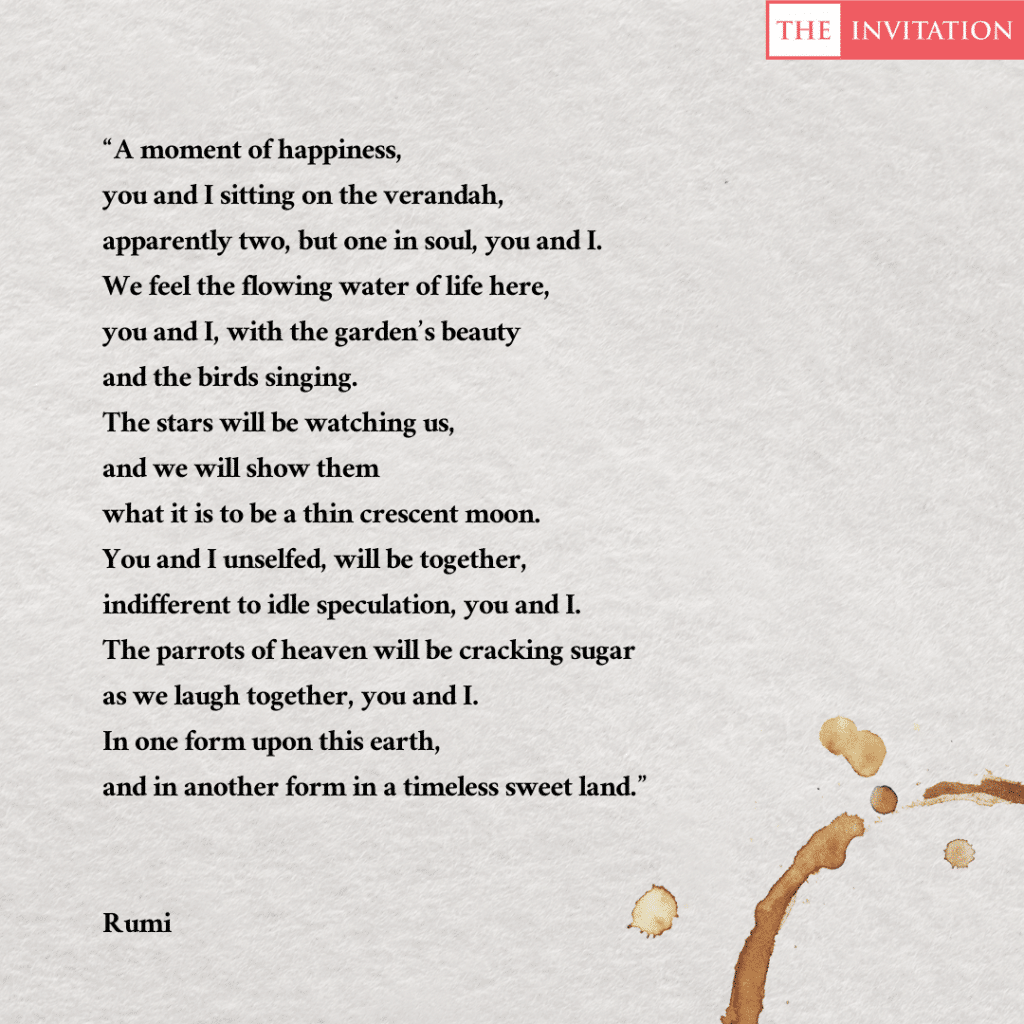Rumi’s poetry has transcended generations, offering insights that resonate profoundly with the human experience. Within the Bahá’í teachings, his exploration of romantic love serves as a powerful metaphor for the soul’s yearning for the Divine, illustrating the profound connection between love and spiritual reunion.
In the realm of Rumi’s verses, romantic love is not merely a fleeting emotion; rather, it is a sacred journey, a transformative odyssey toward discovering one’s true self and the Ultimate Beloved. The metaphor of romantic love becomes a vehicle through which the seeker can traverse the often tumultuous landscape of existence, seeking unity with the Divine essence.
At the heart of Rumi’s philosophy lies the concept of the Beloved, which transcends the physical realm. The Beloved symbolizes the ideal of spiritual perfection, a source of infinite beauty and love. Rumi elevates romantic love to a spiritual plane, suggesting that true love reflects the soul’s deep longing for God. The beloved in this context is not confined to the corporeal form; instead, they embody the divine attributes that compel humanity toward higher ideals.
Rumi eloquently encapsulates this idea in his verse: “Your task is not to seek for love, but merely to seek and find all the barriers within yourself that you have built against it.” This proclamation invites lovers—both of one another and of the Divine—to embark on an introspective journey. The barriers are internal obstructions, misconceptions, and fears that prevent the pure experience of love and connectedness. Rumi emphasizes that love is a liberating force, allowing the soul to shed its limitations and approach the Divine realm.
The process of going through these barriers is akin to a purification, a shedding of the ego that often clouds our perception of love. In this sense, Rumi’s teachings harmoniously align with Bahá’í principles, which advocate for personal transformation as an essential aspect of spiritual growth. Just as Rumi illustrates love as a journey toward self-discovery, so too does the Bahá’í Faith emphasize the transformative power of love in realizing one’s potential and purpose.
Rumi also articulates the idea of separation and longing within love, expressing that the ache for the Beloved is intrinsic to the human condition. “The wound is the place where the Light enters you,” he muses, imparting a profound truth: suffering can serve as a catalyst for spiritual awakening. This longing fuels the flame of devotion, driving the seeker closer to union with the Divine. The Bahá’í teaching espouses a similar belief, emphasizing that trials and tribulations can lead to growth and enlightenment. The pain of separation is not a deterrent; rather, it is a bridge to deeper understanding and ultimate reunion.
Furthermore, Rumi’s poetry richly illustrates the dichotomy of love, embodying both the ecstatic and the tumultuous. Love, as portrayed by Rumi, possesses an unpredictable nature. He often employs the metaphor of wine to elucidate the intoxication that love can bring, suggesting that one can become both euphoric and bewildered. In the context of Bahá’í teachings, love serves a dual purpose; it is both a source of joy and a profound teacher of patience and humility. The exhilaration of love accompanies the painful reminders of one’s limitations, guiding the individual toward a balanced response to both joy and sorrow.
Rumi’s use of nature’s imagery further enriches his metaphysical explorations. He likens the soul’s journey to that of a moth drawn to the flame—a powerful illustration of the irresistible draw toward the Beloved. The moth’s fatal attraction brings to light the themes of sacrifice and surrender; just as a moth might lose its life in a fervent chase, the seekers of truth must be willing to relinquish their sense of self in pursuit of divine love. This ultimate surrender marks the turning point where the individual transcends the mundane and experiences a moment of divine union, echoing the Bahá’í tenet of selflessness in the face of divine grandeur.
Let us explore further Rumi’s assertion that love is the means through which spirituality manifests in the everyday. He writes: “Love is the bridge between you and everything.” This sentiment encapsulates the idea that love is not a mere emotional experience but a profound connection that unites humanity with the Divine essence. Rumi’s portrayal of love as a universal force resonates intricately with the Bahá’í belief in the oneness of humanity. Through love, individuals can transcend societal boundaries, fostering a sense of unity that aligns with the teachings of Bahá’u’lláh.
The unique appeal of Rumi’s romantic love metaphor lies in its duality: it serves as an earnest exploration of human emotions while simultaneously uplifting them to divine realms. In embracing the romantic love of Rumi, one is called to embrace the transformative potential of love, experiencing joy, longing, and ultimately union with the Beloved. This union is not a static state but a dynamic journey—constantly evolving, challenging, and enriching the lover’s soul.
In conclusion, Rumi’s exploration of romantic love encapsulates the essence of human existence and divine aspiration. His poetic expressions serve as beacons, illuminating the path toward spiritual reunion with the Beloved. In the interplay of love’s joy and pain, the teachings resonate profoundly within the framework of Bahá’í spirituality. Love, in all its complexities and beauty, emerges as the ultimate guiding force, orchestrating the soul’s dance toward eternal communion with the Divine. By internalizing these teachings, we are invited to embark on our own journeys of love—a quest that promises not only self-discovery but also a profound connection to the Universal Beloved.
